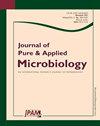橄榄(Olea europaea L.)植物促生长(PGP)性能及细菌种类多样性摩洛哥干旱和半干旱地区的根际
IF 0.6
Q4 MICROBIOLOGY
引用次数: 0
摘要
促进植物生长的根瘤菌(PGPR)在促进植物生长、健康和产量方面发挥着重要作用。在这项研究中,我们描述了与生长在摩洛哥Zouala, erachidia和Essaouira三个地区的橄榄树(Olea europaea L.)相关的PGPR的分离。在这些地区,我们从橄榄树根际分离到95个pgpr,其中78%的pgpr耐4-11%的盐度。我们还发现39%的pgpr是磷酸盐增溶菌(PSB),其增溶能力大于100µg/mL。事实上,Pantoea agglomerans (MRC_ZO_17)和Enterobacter ludwigii (MRC_ZO_97)的磷酸盐增溶率最高,分别为~450µg/mL和~196µg/mL。除了能溶解磷酸盐外,各种菌株还能产生吲哚-3-乙酸(IAA)。例如,E. ludwigii (MRC_ZO_97)的IAA产量为~60.48 g/mL。在盐度较高、有机质含量较低的Zouala地区,厚壁菌门分离株占分离根细菌的87%。有趣的是,我们发现橄榄树相关的pgpr在三个采样区域之间差异很大。本研究中分离的几种根瘤菌是盐碱地植物制剂的极好候选菌。本文章由计算机程序翻译,如有差异,请以英文原文为准。
Plant Growth Promoting (PGP) Performances and Diversity of Bacterial Species Isolated from Olive (Olea europaea L.) Rhizosphere in Arid and Semi-arid Regions of Morocco
Plant Growth Promoting Rhizobacteria (PGPR) play an essential role in enhancing plant growth, health and yield. In this study, we describe the isolation of PGPR associated with the olive tree (Olea europaea L.) grown in three Moroccan regions of Zouala, Errachidia, and Essaouira. In these regions, we isolated 95 PGPRs from rhizosphere of Olive trees, 78% of them were characterized by their tolerance to a salinity of 4-11%. We also found that 39% of these PGPRs were phosphate solubilizing bacteria (PSB) with a solubilization ability greater than 100 µg/mL. In fact, Pantoea agglomerans (MRC_ZO_17) and Enterobacter ludwigii (MRC_ZO_97), showed the highest phosphate solubilization rates of ~450 µg/mL and ~196 µg/mL, respectively. In addition to their ability to solubilize phosphate, various isolates had the ability to produce Indole-3-acetic acid (IAA). For instance, E. ludwigii (MRC_ZO_97) had an IAA production of ~60.48 g/mL. In the region of Zouala, characterized by relatively higher salinity and lower rate of organic matter, Firmicutes isolates account for 87% of the isolated rhizobacteria. Interestingly, we found that the olive tree-associated PGPRs vary significantly between the three sampled regions. Several rhizobacteria isolated in this study are excellent candidates for formulation as bioinocula for plants in saline soils.
求助全文
通过发布文献求助,成功后即可免费获取论文全文。
去求助
来源期刊

Journal of Pure and Applied Microbiology
BIOTECHNOLOGY & APPLIED MICROBIOLOGY-MICROBIOLOGY
CiteScore
2.00
自引率
0.00%
发文量
266
审稿时长
11 months
期刊介绍:
Journal of Pure and Applied Microbiology (JPAM) is a peer-reviewed, open access international journal of microbiology aims to advance and disseminate research among scientists, academics, clinicians and microbiologists around the world. JPAM publishes high-quality research in all aspects of microbiology in both online and print form on quarterly basis.
 求助内容:
求助内容: 应助结果提醒方式:
应助结果提醒方式:


